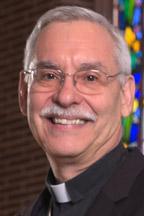
I think you all know that the Last Supper was the new Christian Passover, during which Jesus fulfilled the Old Passover by applying its symbols to himself.
We now offer bread and wine to celebrate Jesus' liberation of us from slavery to the powers of this world on the pattern of our earlier liberation from slavery to Pharaoh in the time of Moses but with two differences:
1) Jesus didn't just offer a lamb in sacrifice; he is the lamb of sacrifice — both priest and victim, and
2) Our bread and wine aren't just reminders of a past event; they actually change to become Jesus himself, really present in his body and blood offered up in sacrifice on this altar.
Just as Pharaoh was defeated when God's angel killed the firstborn of every house not marked by the blood of the Passover lamb, so in an even greater way was Satan defeated by the killing of the firstborn of all creation when Jesus, our new Passover lamb, pours out his saving blood on the doorpost of the cross. Satan, like Pharaoh, can hold us captive against our will no longer.
But our joy today is tempered by the sober realization that our freedom is costly — bought with blood (Egyptians died, Jesus died) and not easy to preserve. Like those Israelites who, when things got rough in the desert, wanted to return to the fleshpots of Egypt, even if it meant a return to a slavery, we too sometimes forget the value of our freedom and its cost, including its cost to us: the death to self that continues to be required of us who truly want to live the life of freedom.
For that reason Jesus did a very curious thing right in the middle of the Last Supper: he washed his disciples' feet. He did this to emphasize the fact that he sets us free not only from something, but also for some-thing (a life of sacrificial service modeled on him). Not just from negative things (Satan, sin and death) but also for positive things, giving us meaning and purpose, something to live for bigger than ourselves.
Jesus emphasizes that though his plan of salvation is glorious in a cosmic sense, it can be accomplished in our lives (just as in his) only through un-glorious self-sacrificing service, only at the cost of humble and sometimes even humiliating death to self. And that's the life we commit ourselves to in every Mass when we offer up in sacrifice on this altar not only Jesus sacramentally in his body and blood, but also ourselves in union with him. And in so doing we commit ourselves to sharing in Jesus’ own un-glorious suffering and death today in the confident expectation that if we die to ourselves in faithfulness to him, we will share also in his victory — both his Easter victory over sin and death and his final victory at the end of time.
Bishop Anthony B. Taylor delivered this homily Holy Thursday, April 6.
Please read our Comments Policy before posting.
Article comments powered by Disqus Studio 3:16 offers new approach to teaching religion
Studio 3:16 offers new approach to teaching religion
 After three decades, NLR principal plans to retire
After three decades, NLR principal plans to retire
 CHS athlete overcomes odds to reach collegiate goal
CHS athlete overcomes odds to reach collegiate goal
 John Calipari: UA basketball coach and devout Catholic
John Calipari: UA basketball coach and devout Catholic
 'Cabrini' film tells story of saint with great faith
'Cabrini' film tells story of saint with great faith
 St. Joseph a model of solidarity with immigrants
St. Joseph a model of solidarity with immigrants
 Two gifts after Jesus’ death: Virgin Mary and Eucharist
Two gifts after Jesus’ death: Virgin Mary and Eucharist
 Why we have an altar, and not just a communion table
Why we have an altar, and not just a communion table
 Pope: Wars should be resolved through nonviolence
Pope: Wars should be resolved through nonviolence
 Living relationship with Jesus Christ in the Eucharist
Living relationship with Jesus Christ in the Eucharist